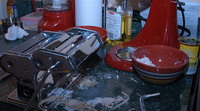Staged pasta strike in Italy aimed at decrease in prices
To fight against rising prices for the beloved Italian staple, Italians have to refrain from buying pasta.

Consumer groups organized protests in Rome, Milan and Palermo - and even handed out free pasta, bread and milk to passers-by to help ease the pain for those who decided to support the strike and forego pasta purchases at supermarkets and restaurants.
Activists say Italians will soon be paying up to 20 percent more for their daily serving of fettuccine, spaghetti or linguini. They say prices are being driven up by middlemen, while earnings for farmers and producers remain flat.
"Prices increase by five times between production and consumption," Toni De Amicis, a leader of Italian farm lobby Coldiretti, said during a protest in Rome. "The right recipe is to reduce the gap between production and consumption."
Similar charges have been lodged in France, where shoppers are grumbling that their aromatic baguettes will soon cost more because of rising flour prices. A consumer group warned in August of likely bread price rises of about 8 percent.
The warning prompted accusations that supermarket chains were disproportionately hiking prices on breads, as producers noted that the price of flour only represents 5 percent of the total price of bread.
On average across France, the price of bread rose 1.1 percent in August, according to the statistics agency INSEE. A crusty long loaf costs about 70 euro cents (97 US cents).
The EU's Agriculture Commissioner Mariann Fischer Boel, meanwhile, called for increased production of crops like wheat, oats and barley to counter widespread cereal shortages on the world market that have been blamed for rising commodity prices.
Boel urged EU governments to back a plan allowing grain farmers across the 27-nation bloc to plant crops on all their fields. Under rules from 1992 designed to prevent overproduction and to preserve habitats, all farmers are barred from planting on 10 percent of their total crop field holdings.
Fischer Boel has recommended the rule be put on hold for a year, to fill shortages of cereals on the world market.
The impact of Thursday's pasta strike seemed more symbolic, since shoppers typically stock up on their pasta, buying multiple packages at a time to always have it at hand. Few shoppers or diners, for that matter, seemed to give it much notice at all.
"I wasn't aware of the strike, but I do know about the expensive prices," said 34-year-old Emanuela Mafrolla, a consultant and mother shopping in central Rome. "Pasta is a basic dish. How could I possibly give it up?"
At a Roman trattoria, a diner who only identified himself as Giovanni echoed a similar sentiment as he set in to a plate of fettuccine for lunch.
"Today is pasta strike and we eat it anyway!"
At Rome's Rebibbia prison, however, inmates were taking part, refraining from buying grain products at the prison shop, the ANSA news agency reported. They were, however, eating pasta and other products provided to them in the prison cafeteria.
Economists and producers say pasta price hikes are being driven by increasing wheat prices worldwide. The demand for wheat is the result of several trends, chiefly an increasing demand for biofuels, which can be made from wheat, and improved diets in emerging countries where putting more meat on the table is raising the demand for feed for livestock, said Francesco Bertolini, an economist at Milan's Bocconi University.
As a result, wheat stocks worldwide are being depleted to their lowest levels in decades and grain prices are soaring.
Italy produces only about half of the high-protein durum wheat used to make high-quality pasta and bread; the rest is imported from overseas markets including the United States, Canada and Ukraine.
Still, even with the projected increases, "There is no dish that costs less," said Furio Bragagnolo, the vice president of the Italian pasta manufacturers association. "Whoever decides to strike against pasta will spend more on whatever they buy instead. A plate of pasta probably costs less than an apple."
Subscribe to Pravda.Ru Telegram channel, Facebook, RSS!


